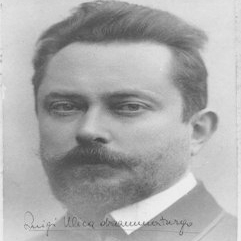
Luigi Illica
Playwright, Librettist, Lyricist
Biography
Luigi Illica
Luigi Illica (1857–1919) was an Italian dramatist and librettist who played a central role in shaping some of the most iconic operas of the late 19th and early 20th centuries. Born in Castell’Arquato, a small town in northern Italy, Illica began his career as a journalist and playwright. His early work in the theatre, particularly in naturalistic and verismo dramas, laid the foundation for the vivid storytelling and attention to human emotion that would later characterize his libretti. He became known for his sharp sense of dialogue and his ability to create compelling, believable characters on stage.
Illica’s transition to opera came at a pivotal moment in Italian musical history, when composers sought stories that reflected realism and heightened dramatic tension. His gift for theatrical pacing and his flair for emotional conflict made him an ideal collaborator for leading composers. Illica often worked in partnership with fellow librettist Giuseppe Giacosa, forming one of the most successful writing duos in operatic history. While Illica focused on crafting the dramatic structure and dialogue, Giacosa refined the poetic verse, together producing libretti of enduring power and elegance.
This collaboration reached its height with Giacomo Puccini, resulting in three of the composer’s greatest works: La Bohème (1896), Tosca (1900), and Madama Butterfly (1904). In each, Illica’s dramatic instincts shine through, whether in the realistic depiction of struggling artists in La Bohème, the tense political intrigue of Tosca, or the tragic clash of cultures in Madama Butterfly. His ability to balance intimate human struggles with broader social or political backdrops was key to these operas’ success, ensuring their lasting place in the repertoire.
Beyond Puccini, Illica collaborated with other composers, contributing to the libretti of works such as Umberto Giordano’s Andrea Chénier (1896) and Alfredo Catalani’s La Wally (1892). These operas, like his work with Puccini, reflect Illica’s talent for combining sweeping drama with deeply personal narratives. His contributions to verismo opera in particular helped define the movement’s aesthetic, emphasizing realism, passion, and stark portrayals of human fate. His theatrical background gave his libretti a unique dramatic energy that distinguished them from more conventional operatic texts of the time.
Illica remained active in the operatic world until his death in 1919, continuing to write plays and libretti that enriched the Italian stage. Though his name is often overshadowed by the composers he worked with, his influence on opera is undeniable. His libretti provided the narrative frameworks for some of the most beloved operas ever written, and his partnership with Giacosa and Puccini stands as one of the most fruitful collaborations in musical history. Today, Luigi Illica is remembered as a master dramatist whose words gave life to music and whose artistry helped shape the golden age of Italian opera.
Shows
Shows associated with Luigi Illica
Songs
Songs from shows associated with Luigi Illica
Videos
Videos associated with Luigi Illica
Quizzes
Quizzes associated with Luigi Illica
Learning Modules
Learning modules associated with Luigi Illica
Additional Information
N/A